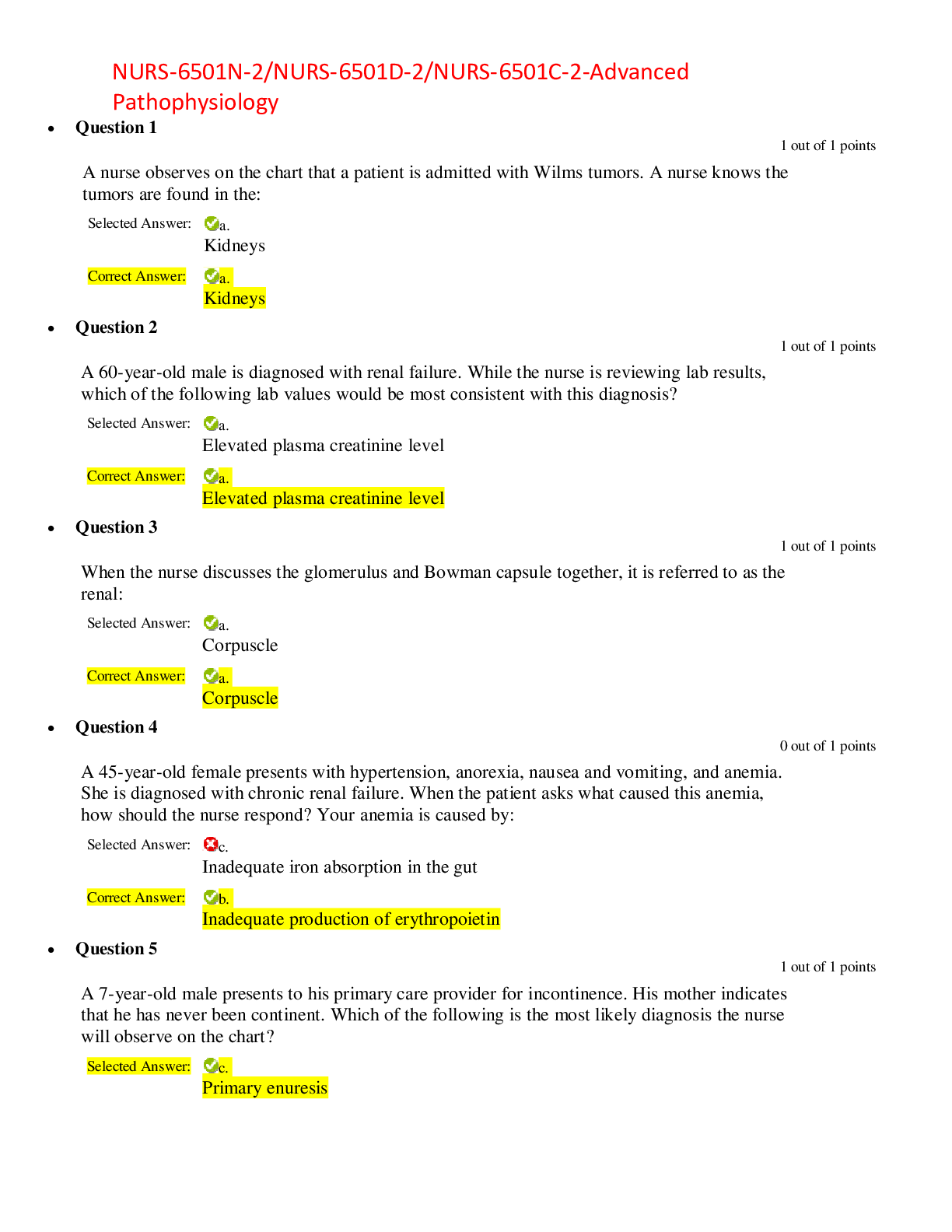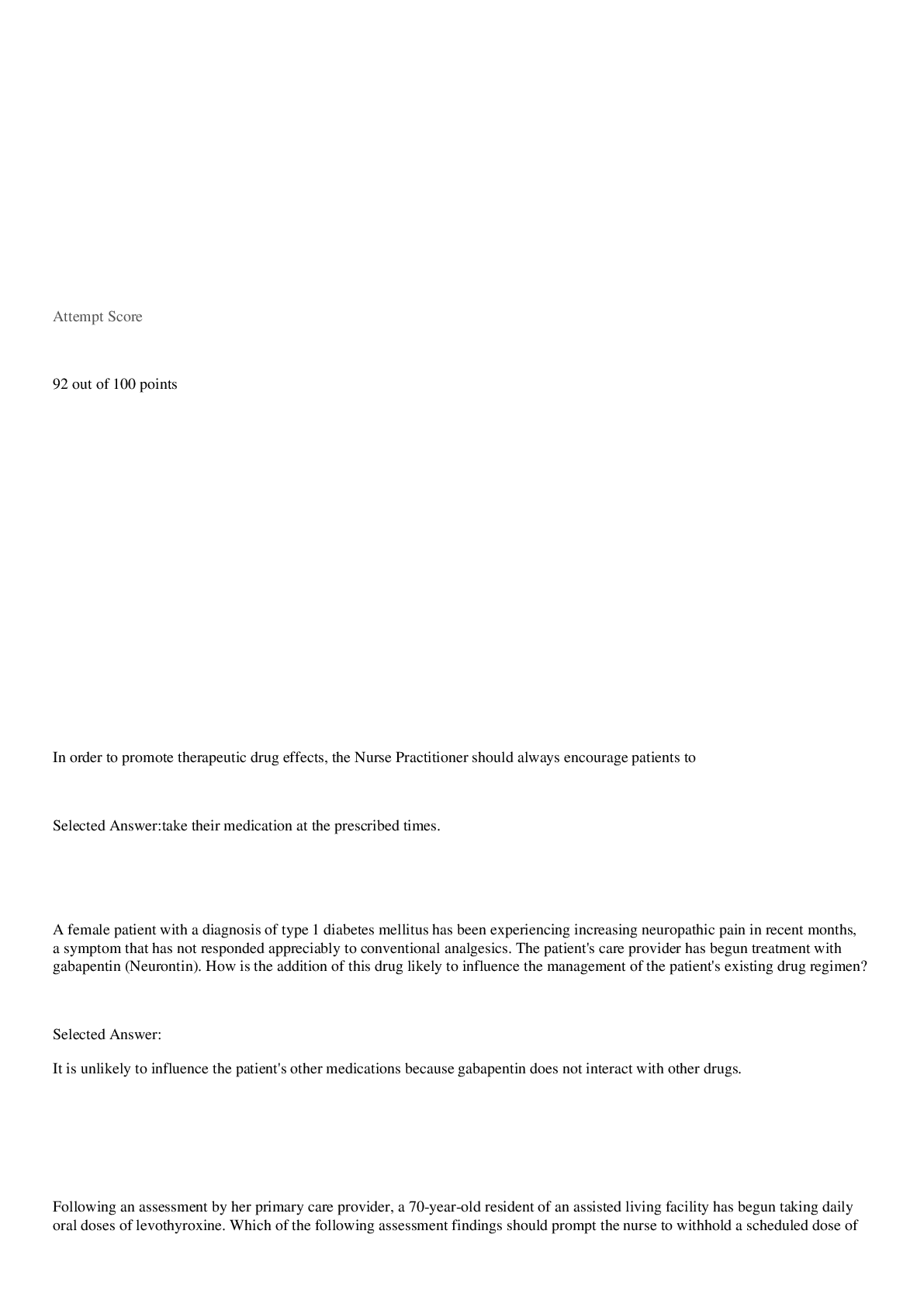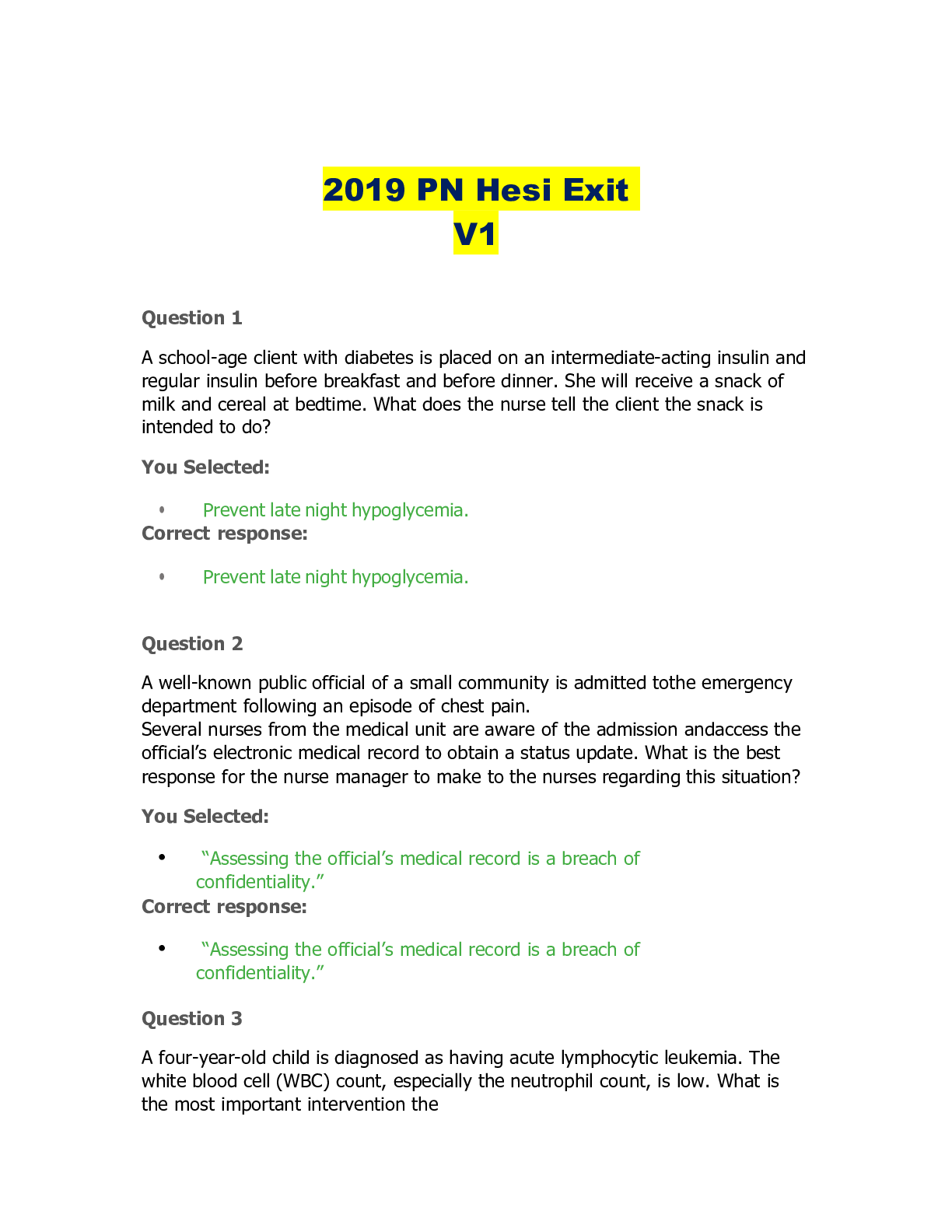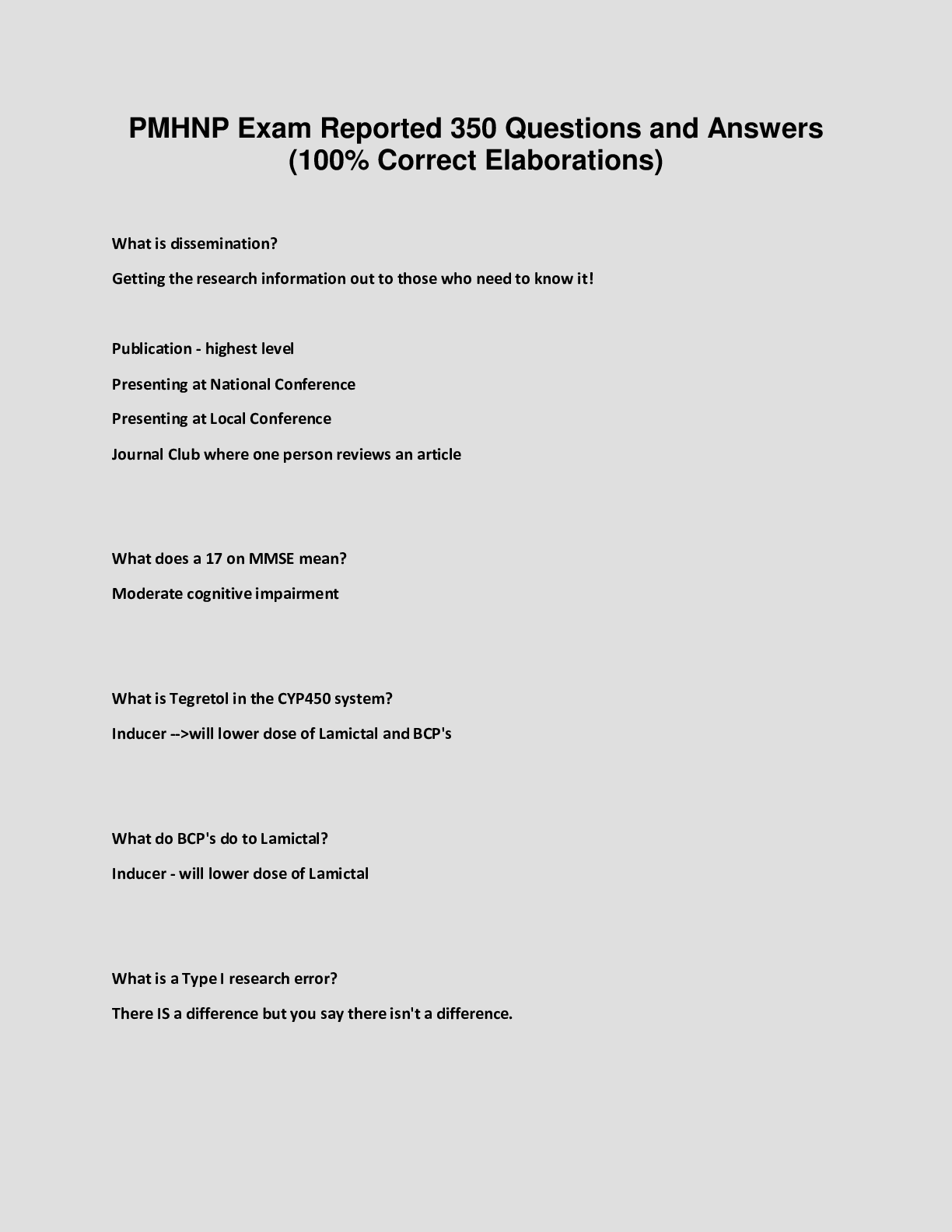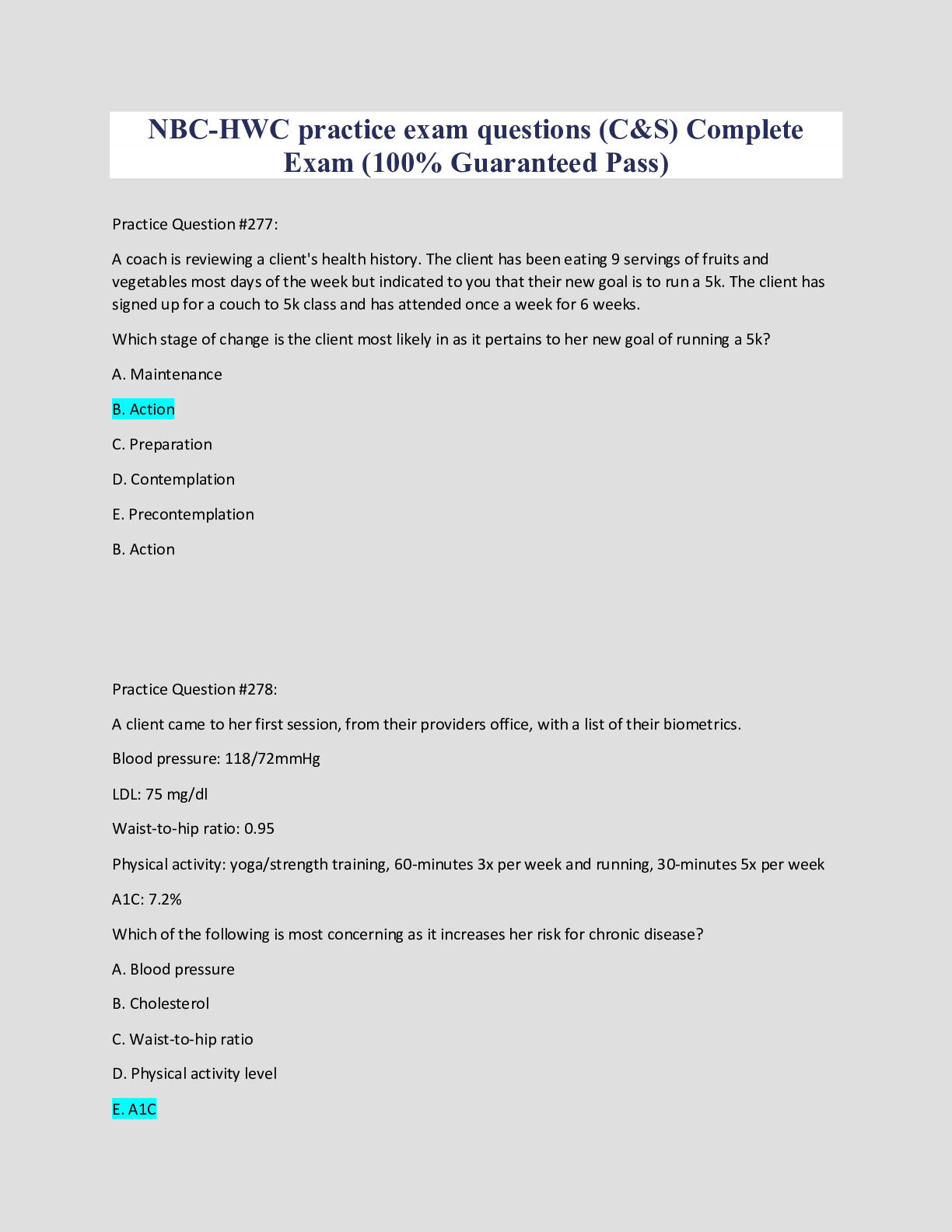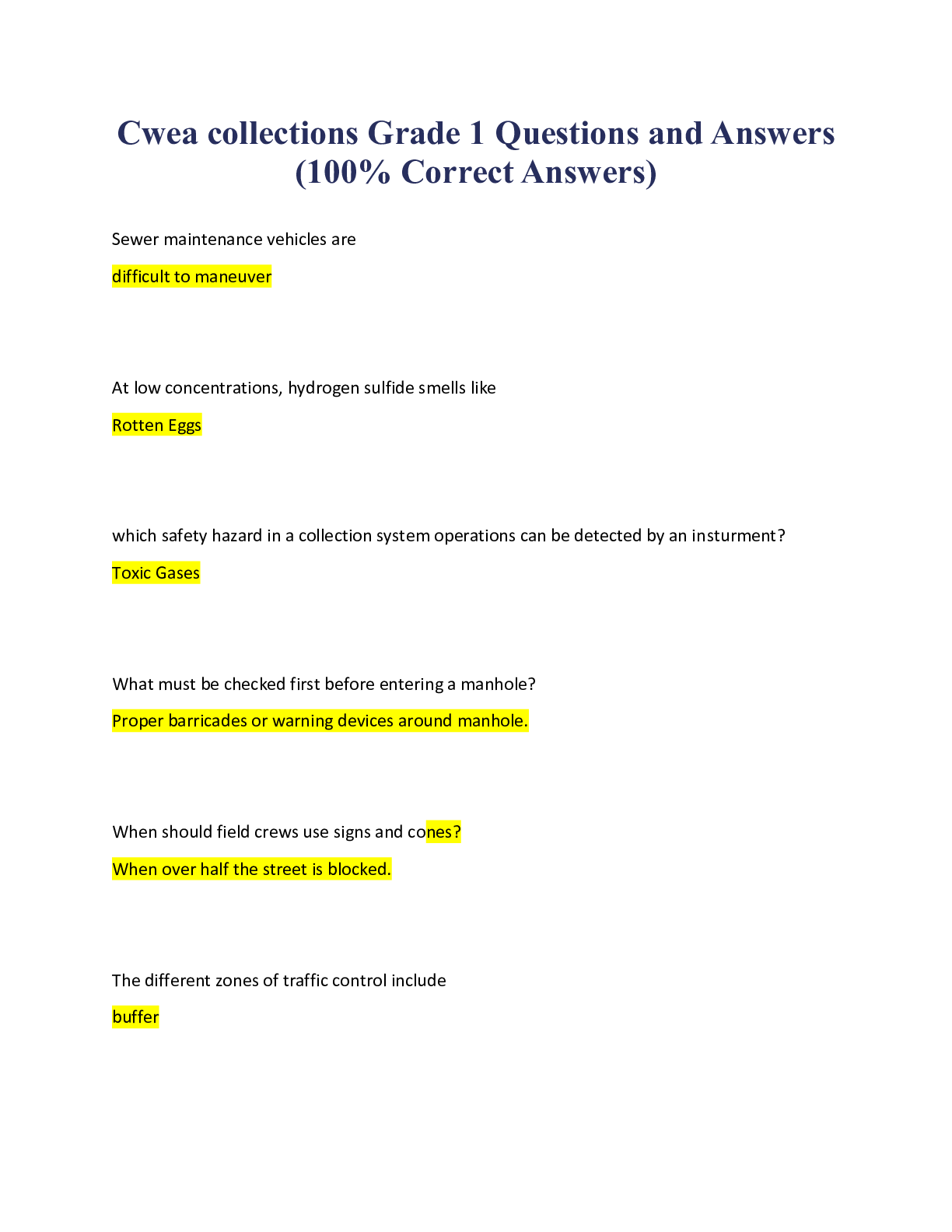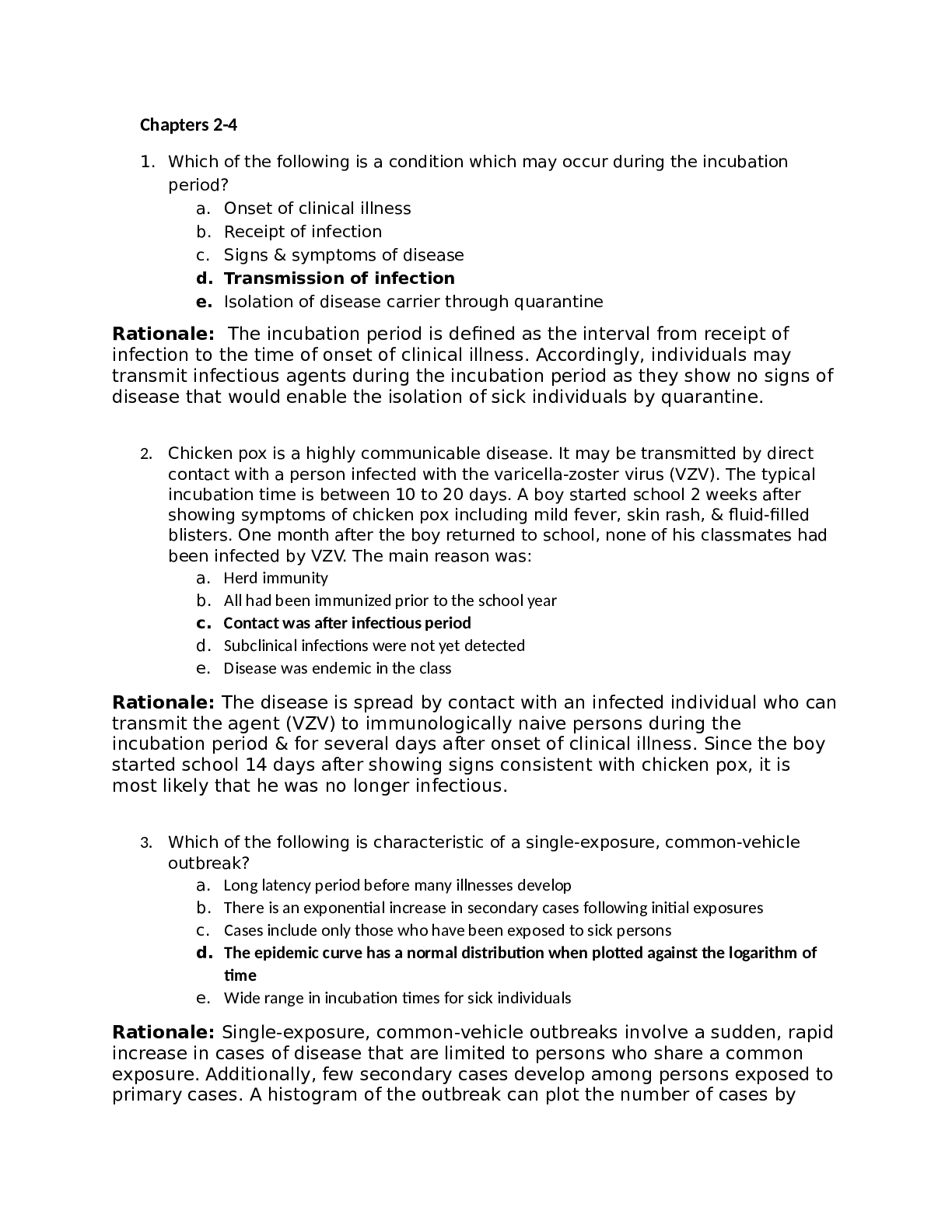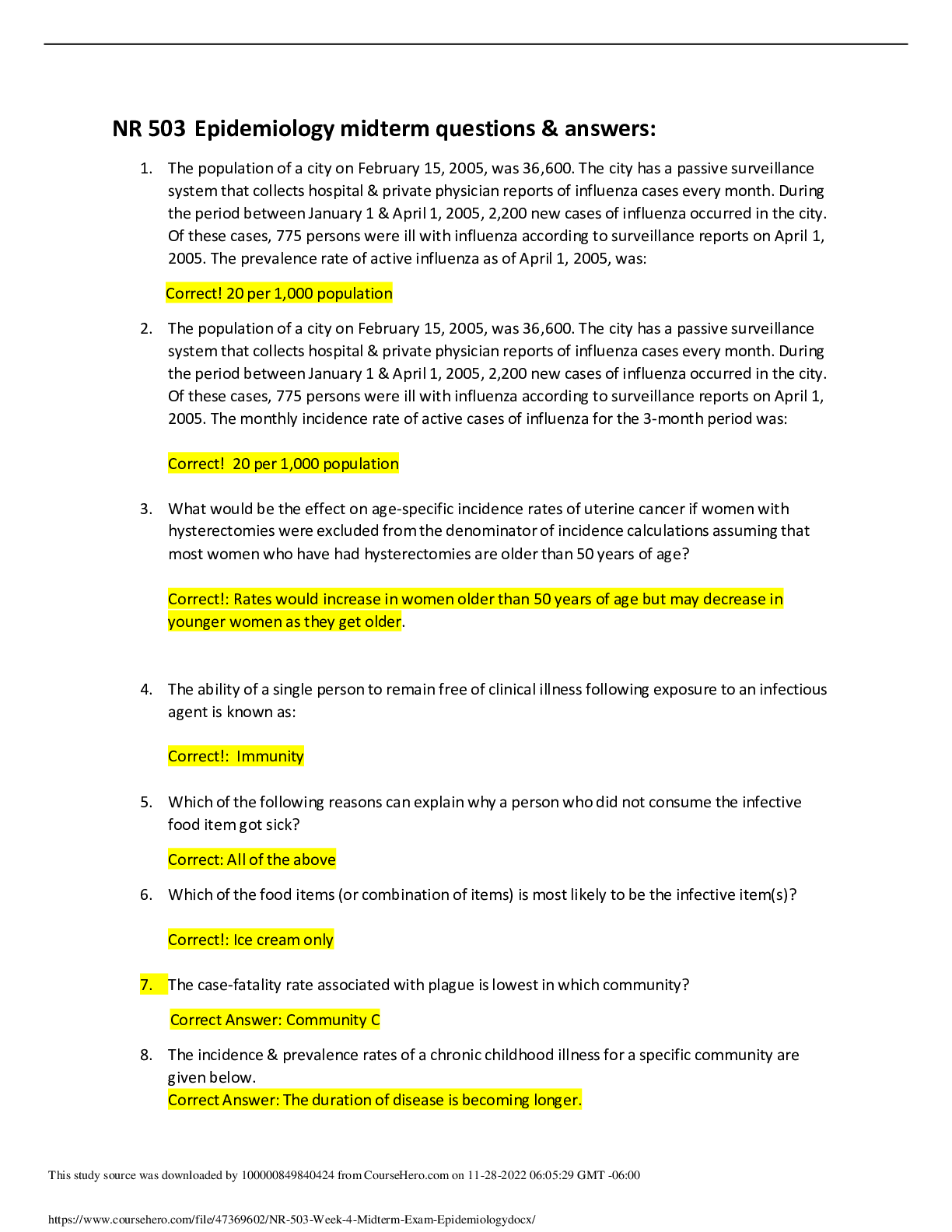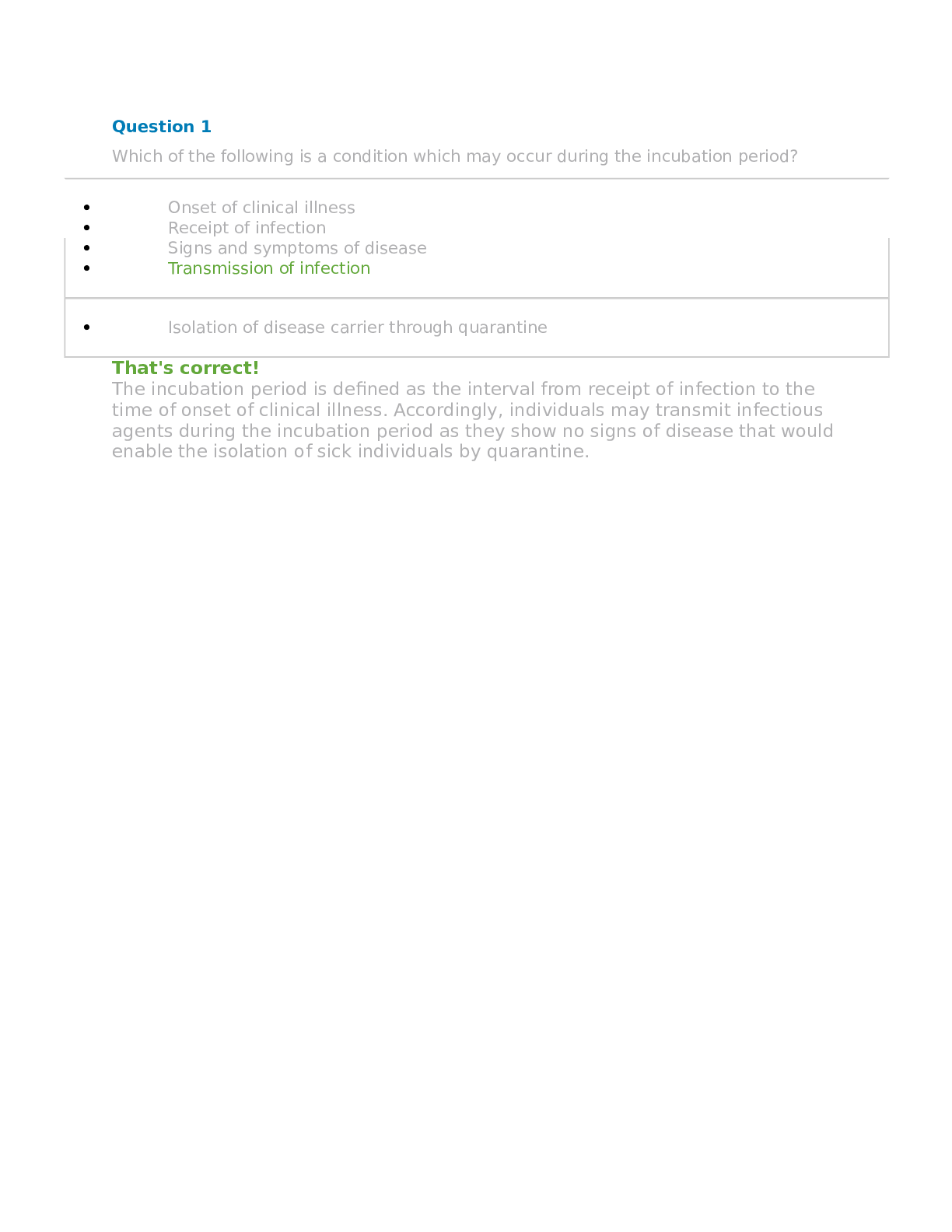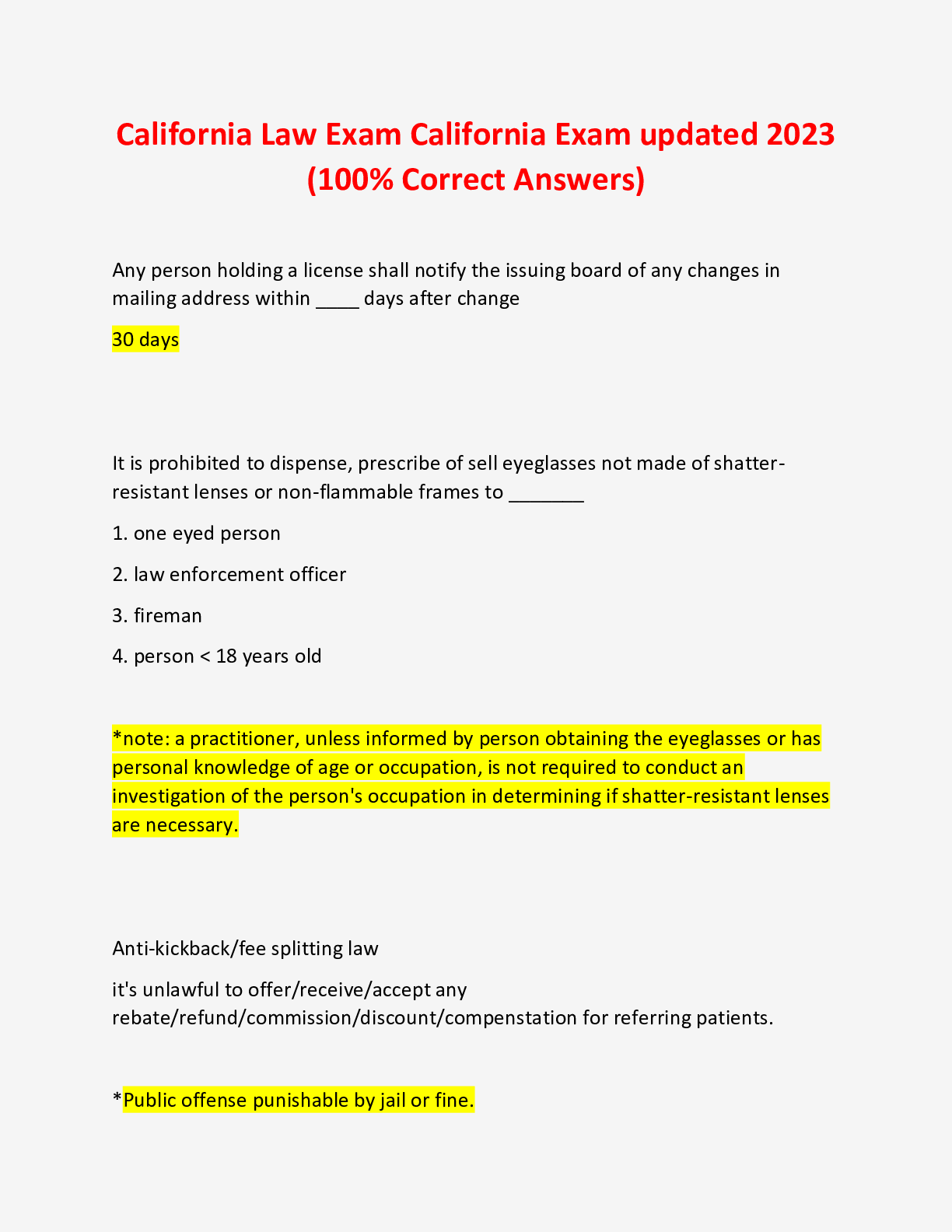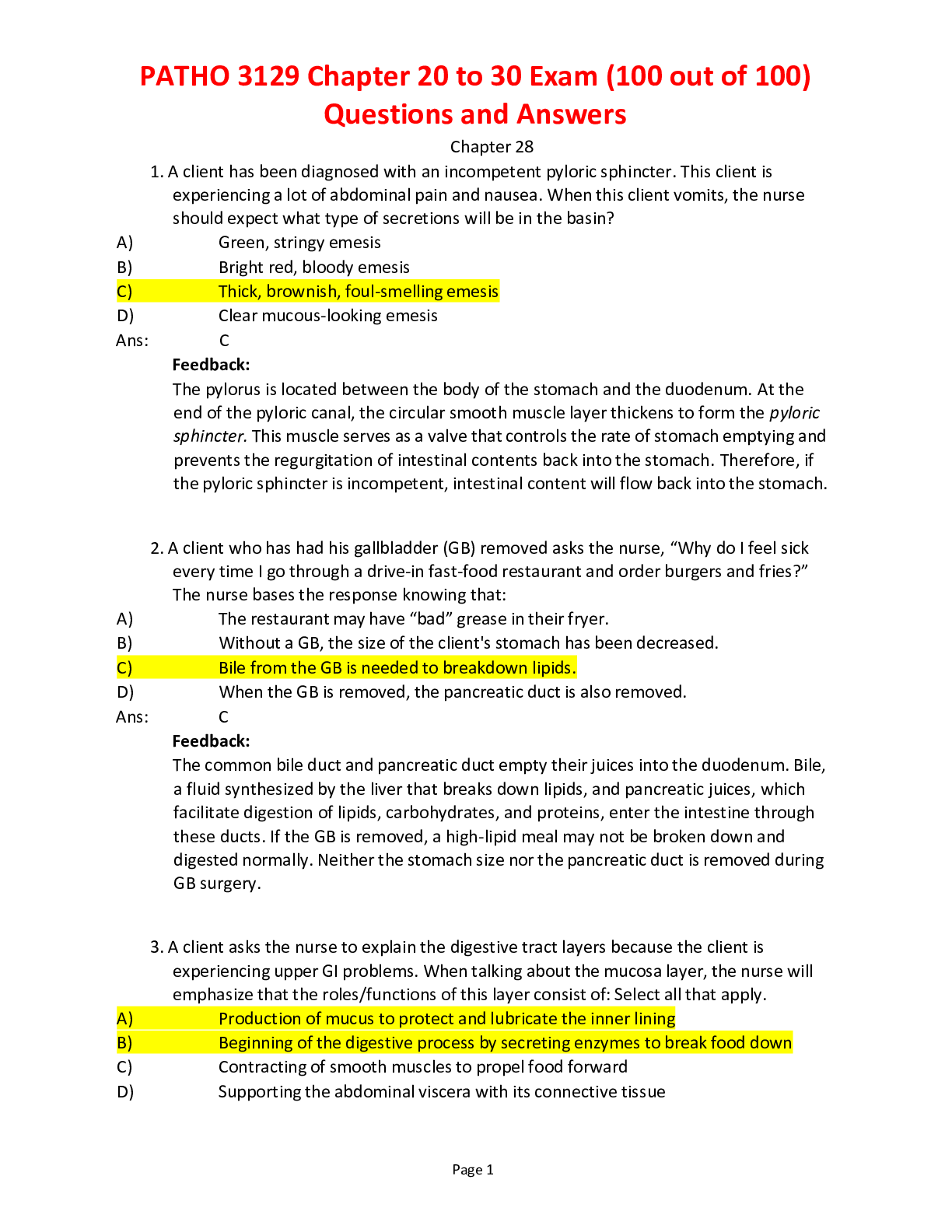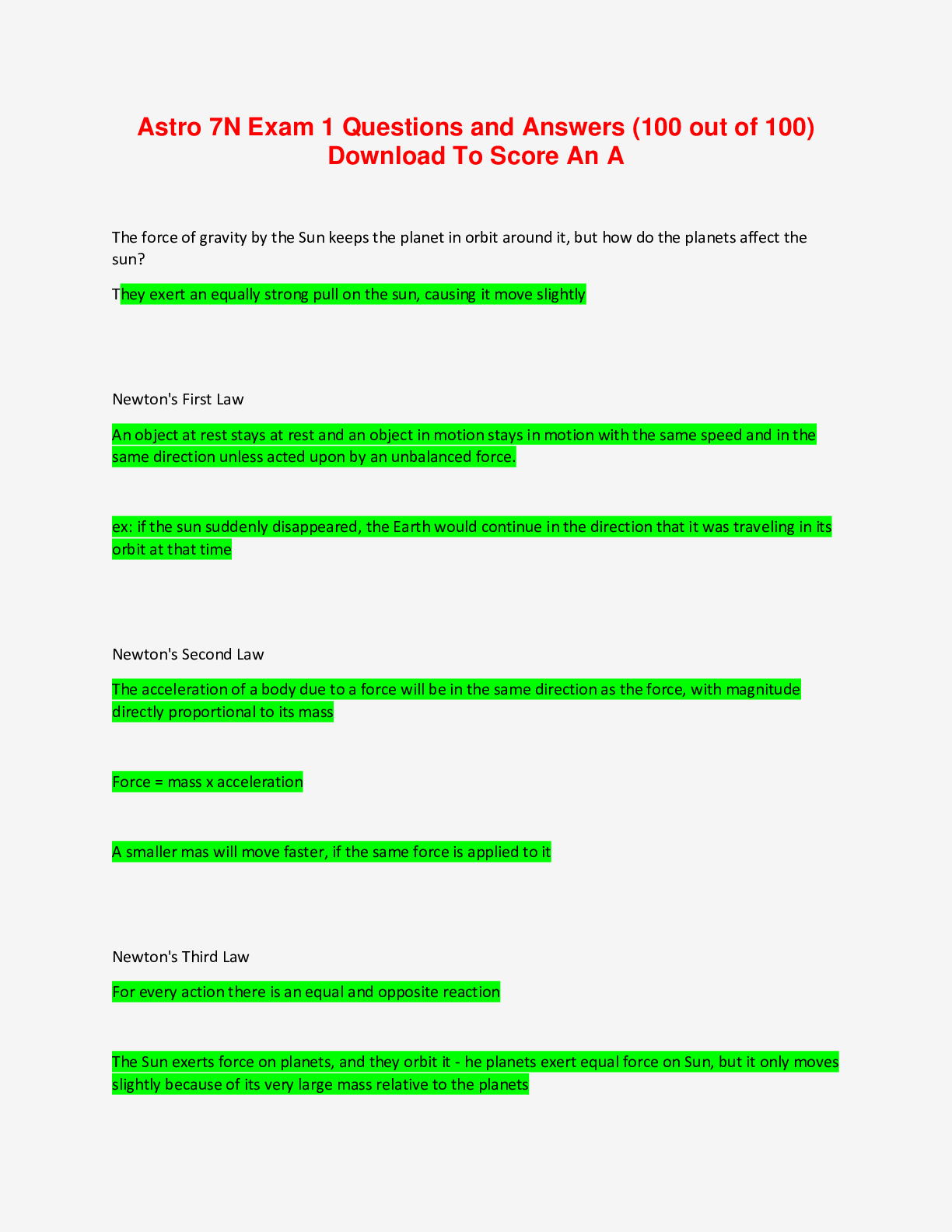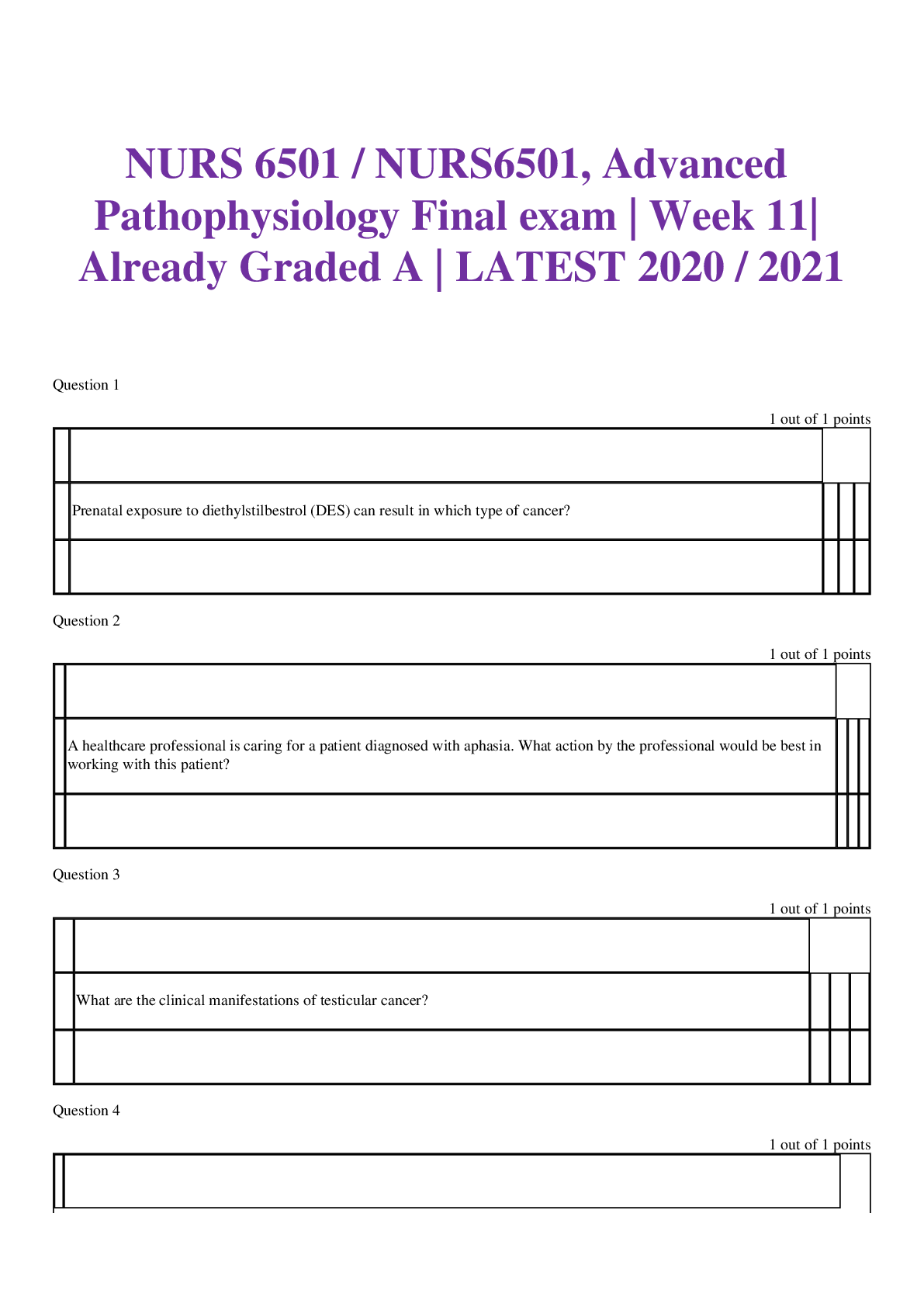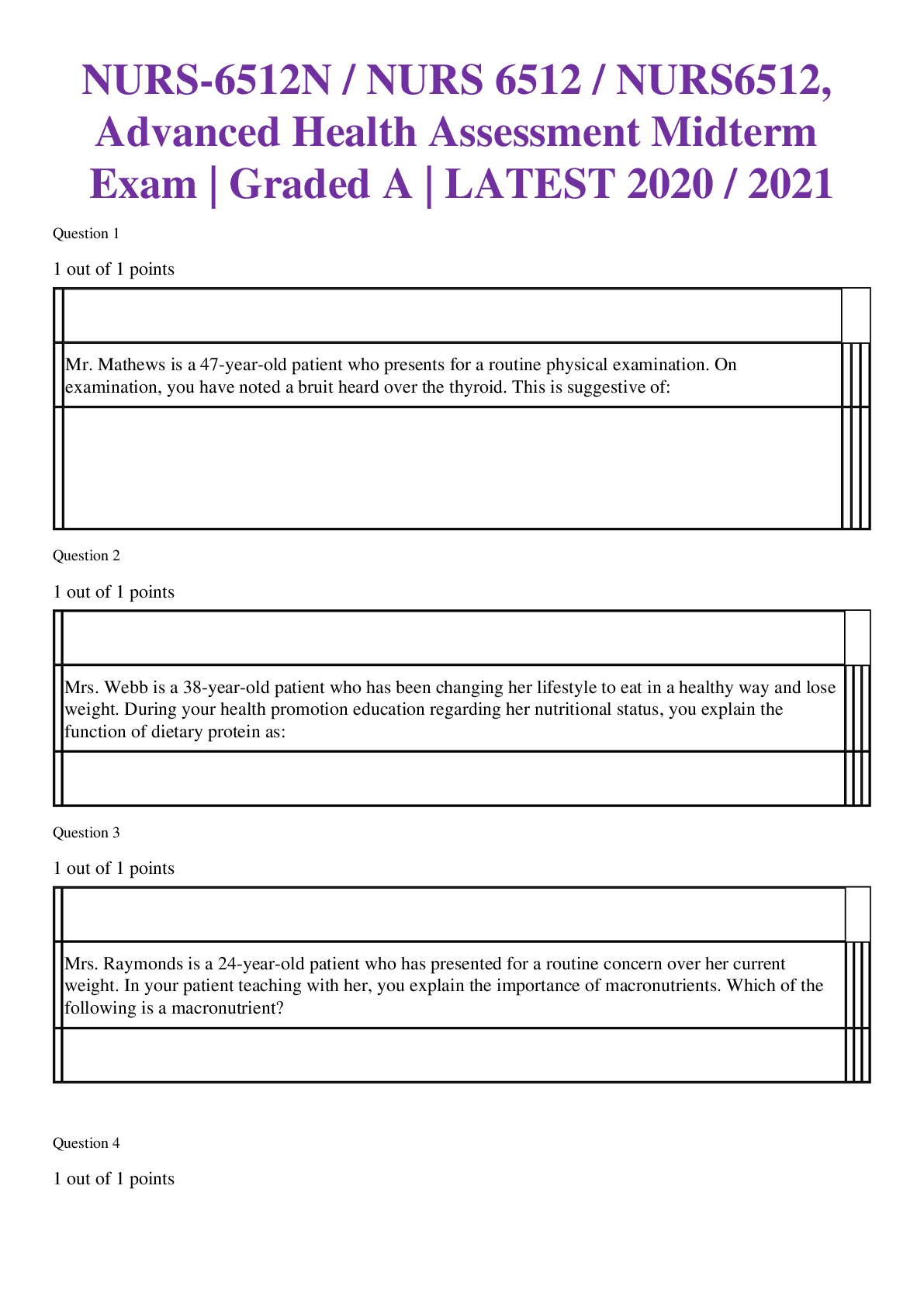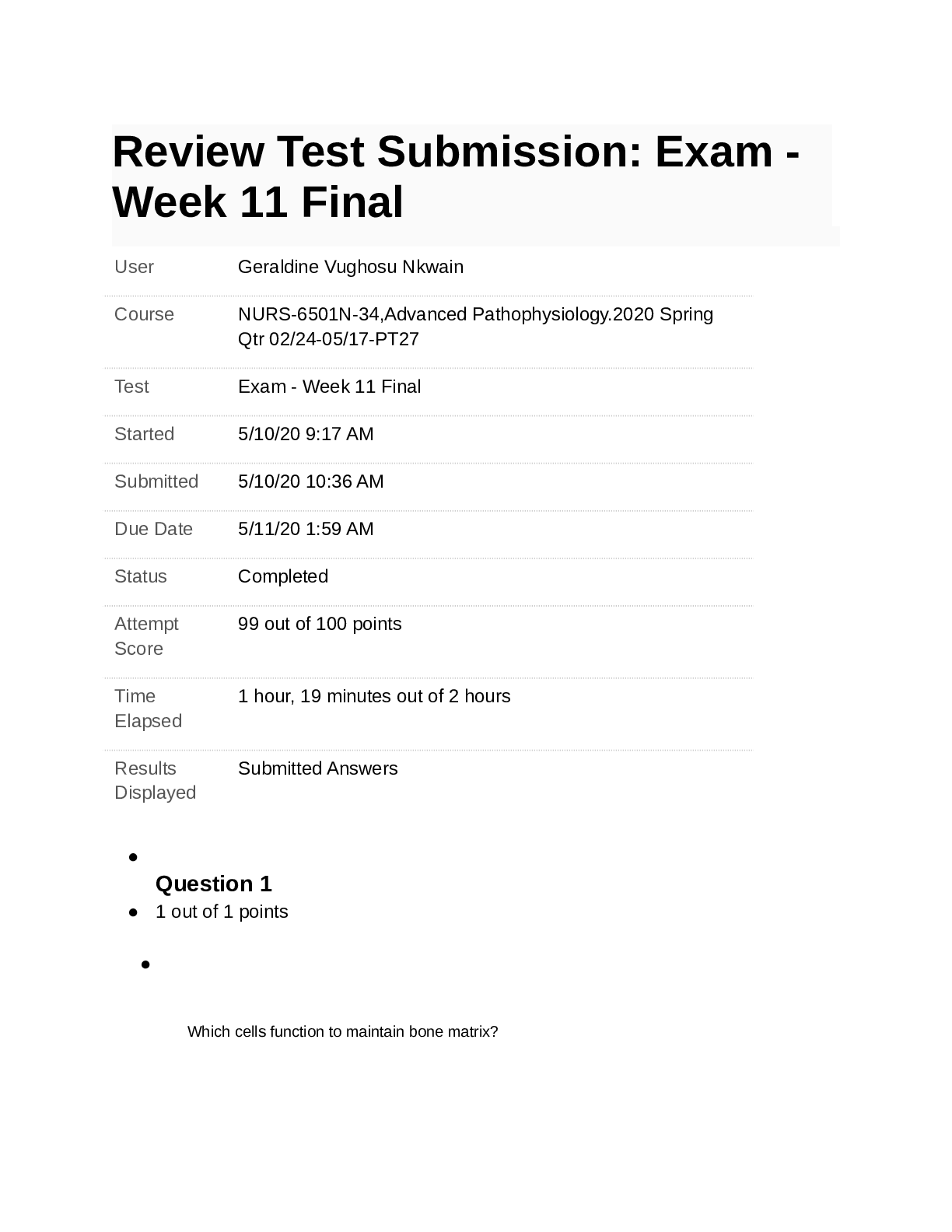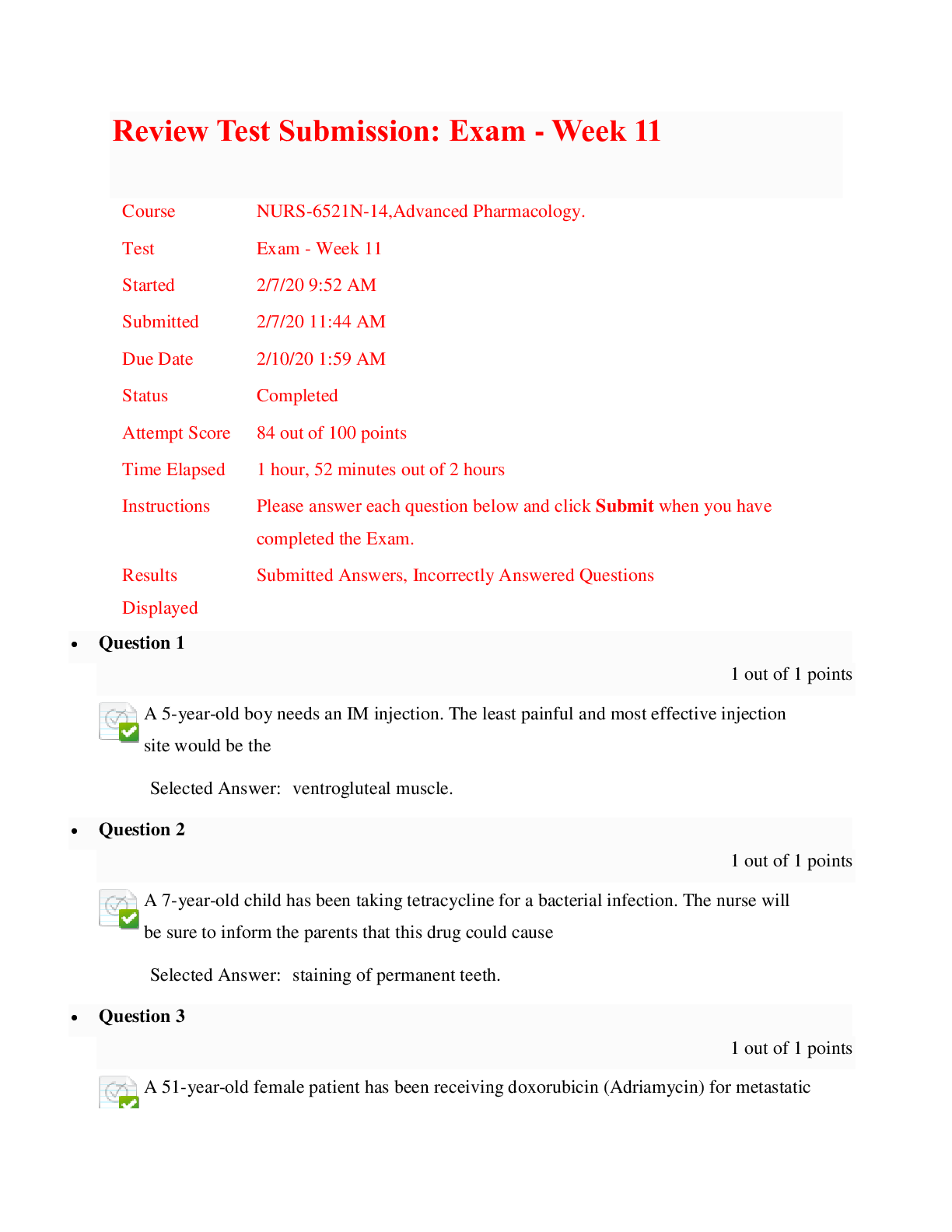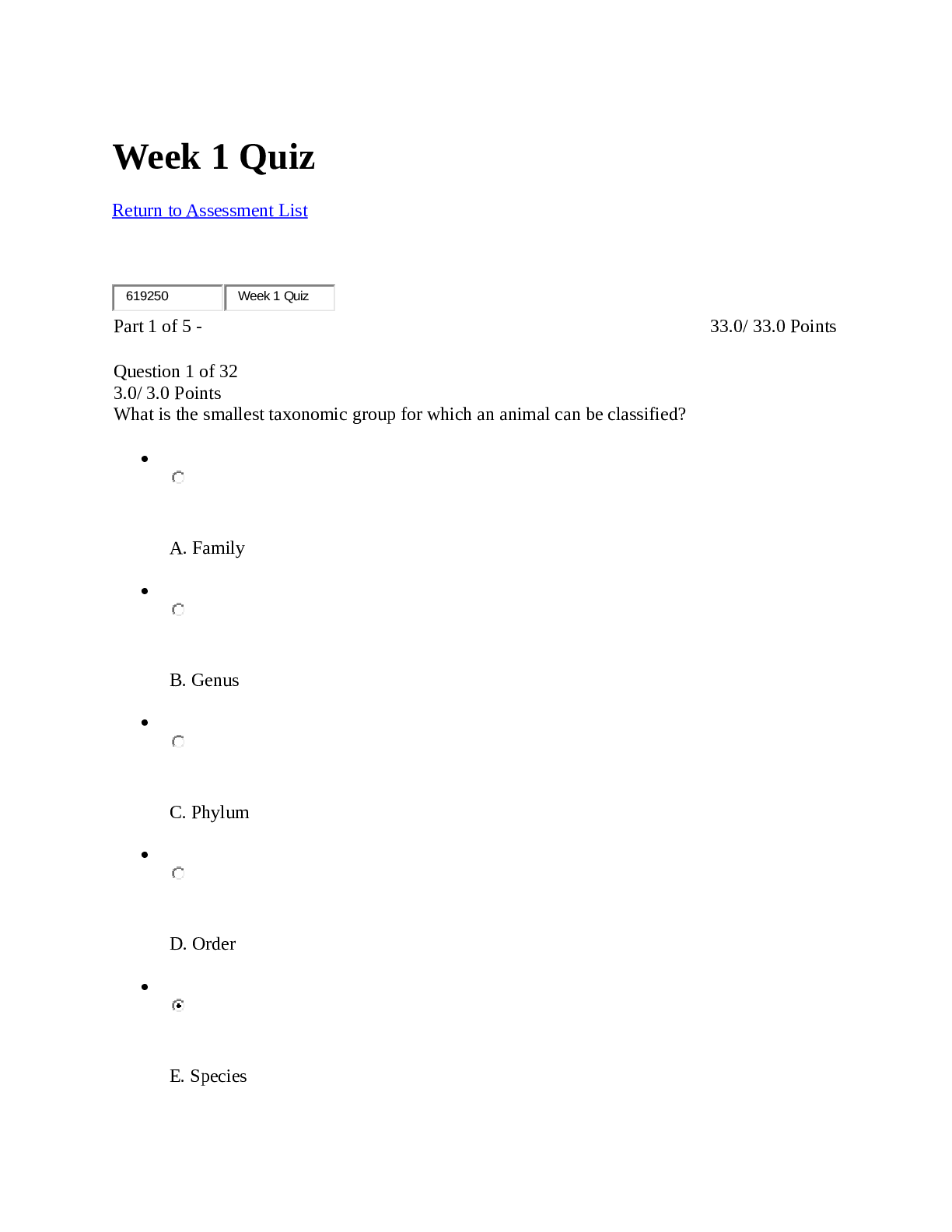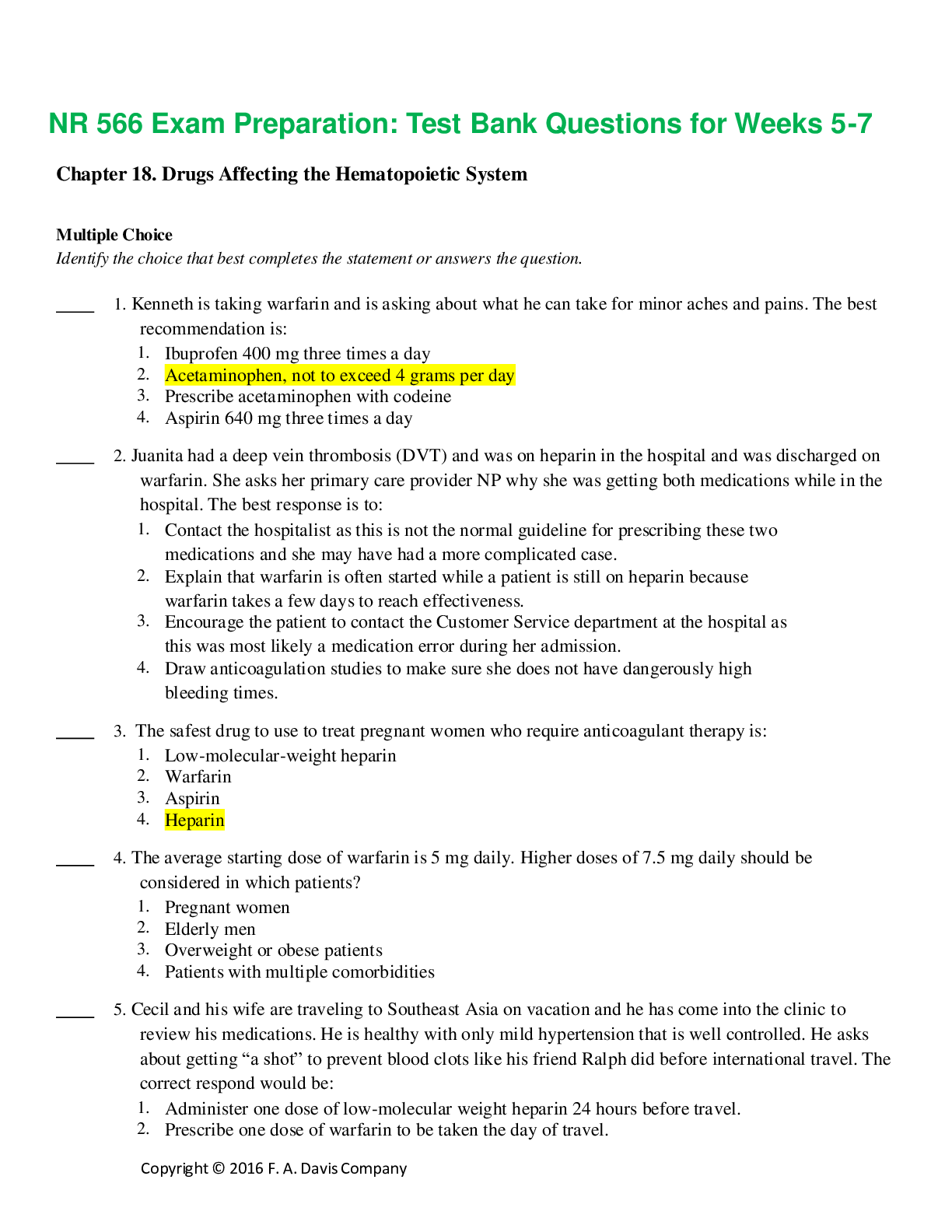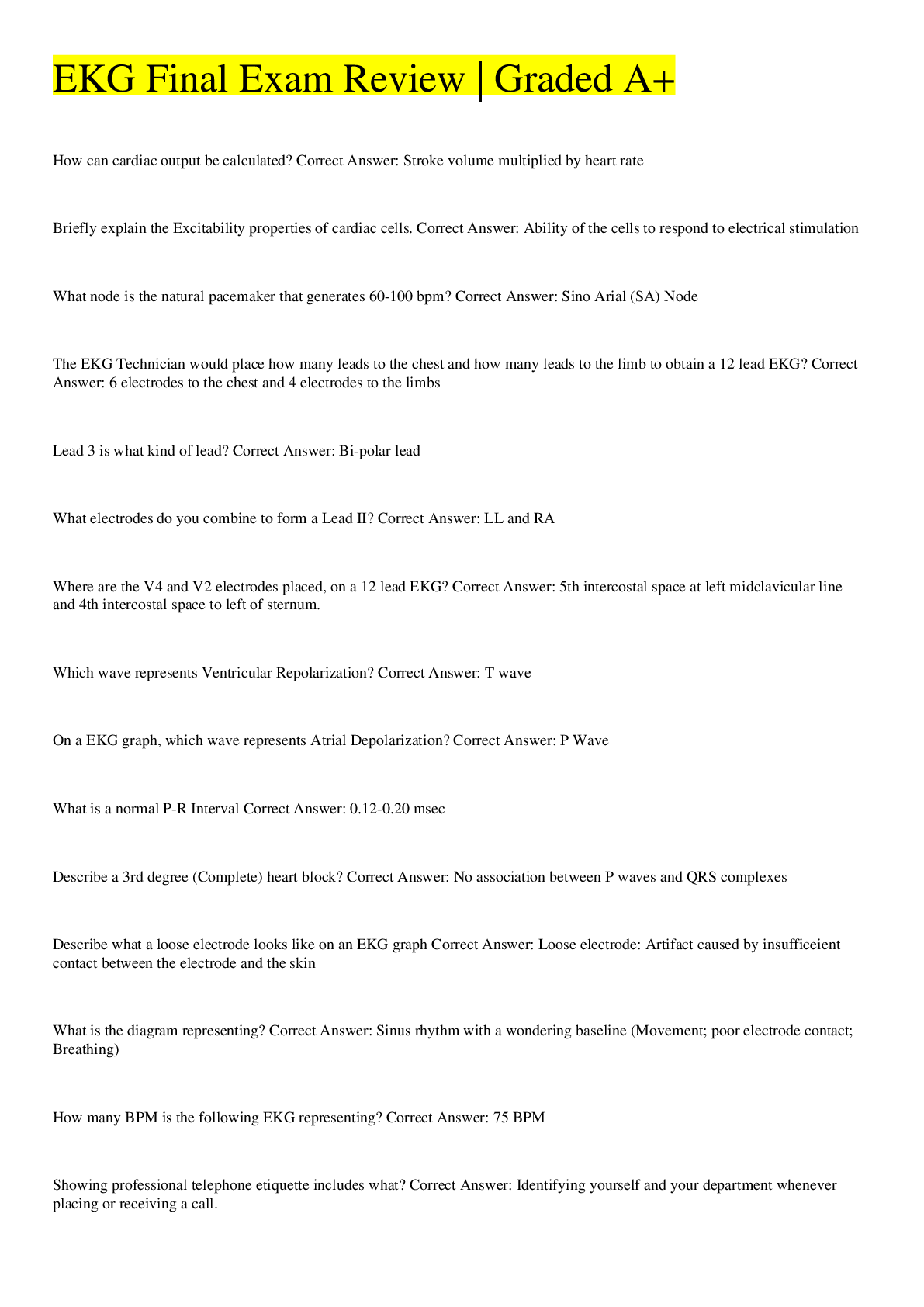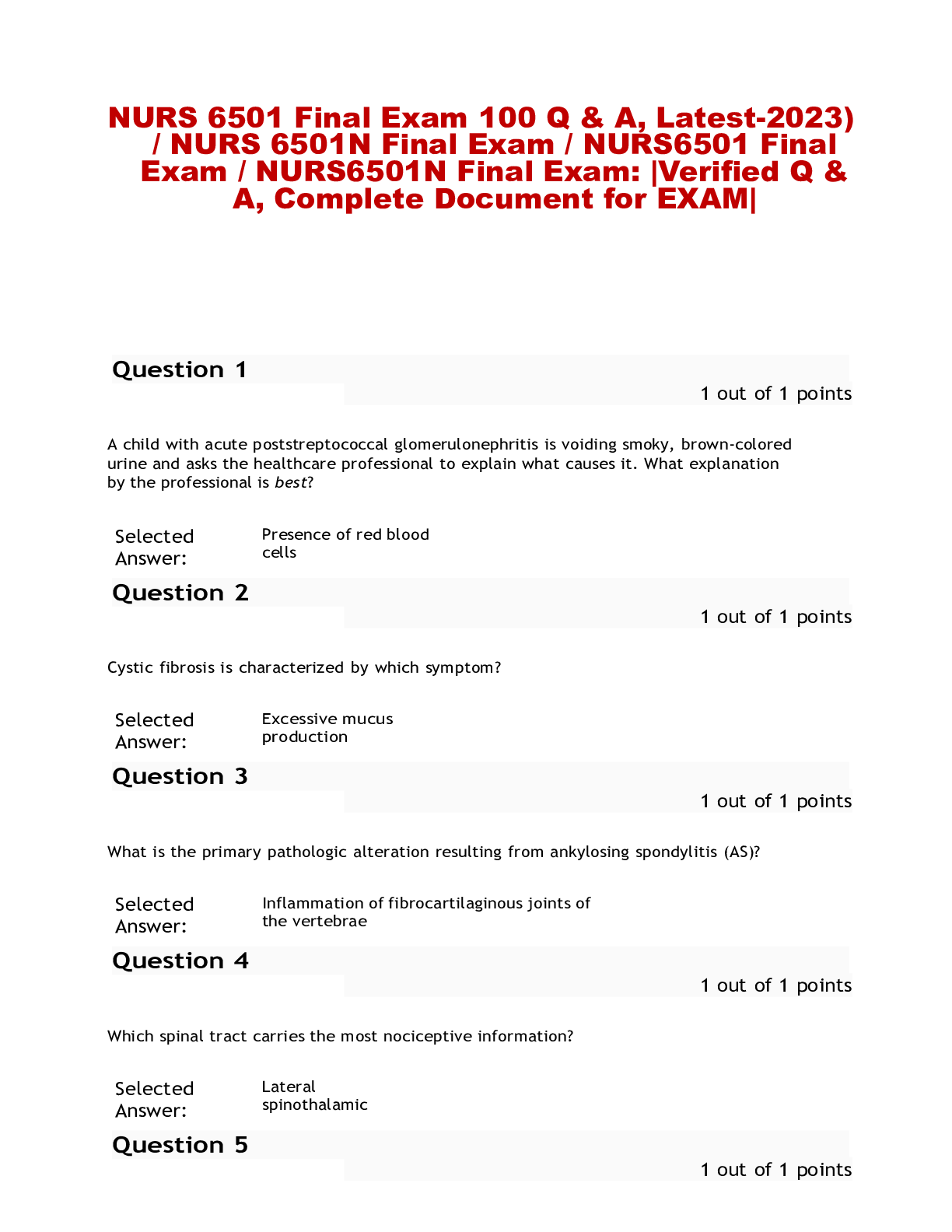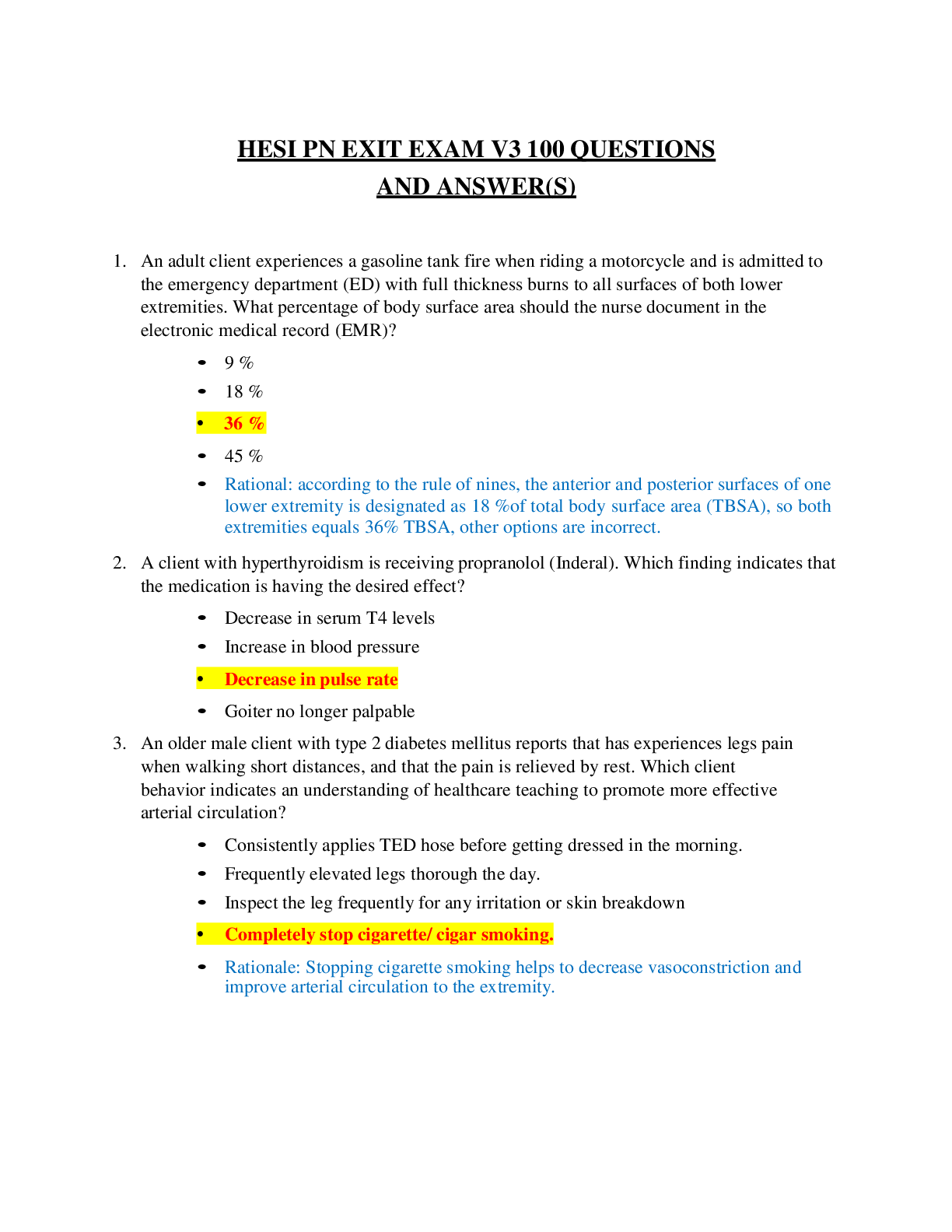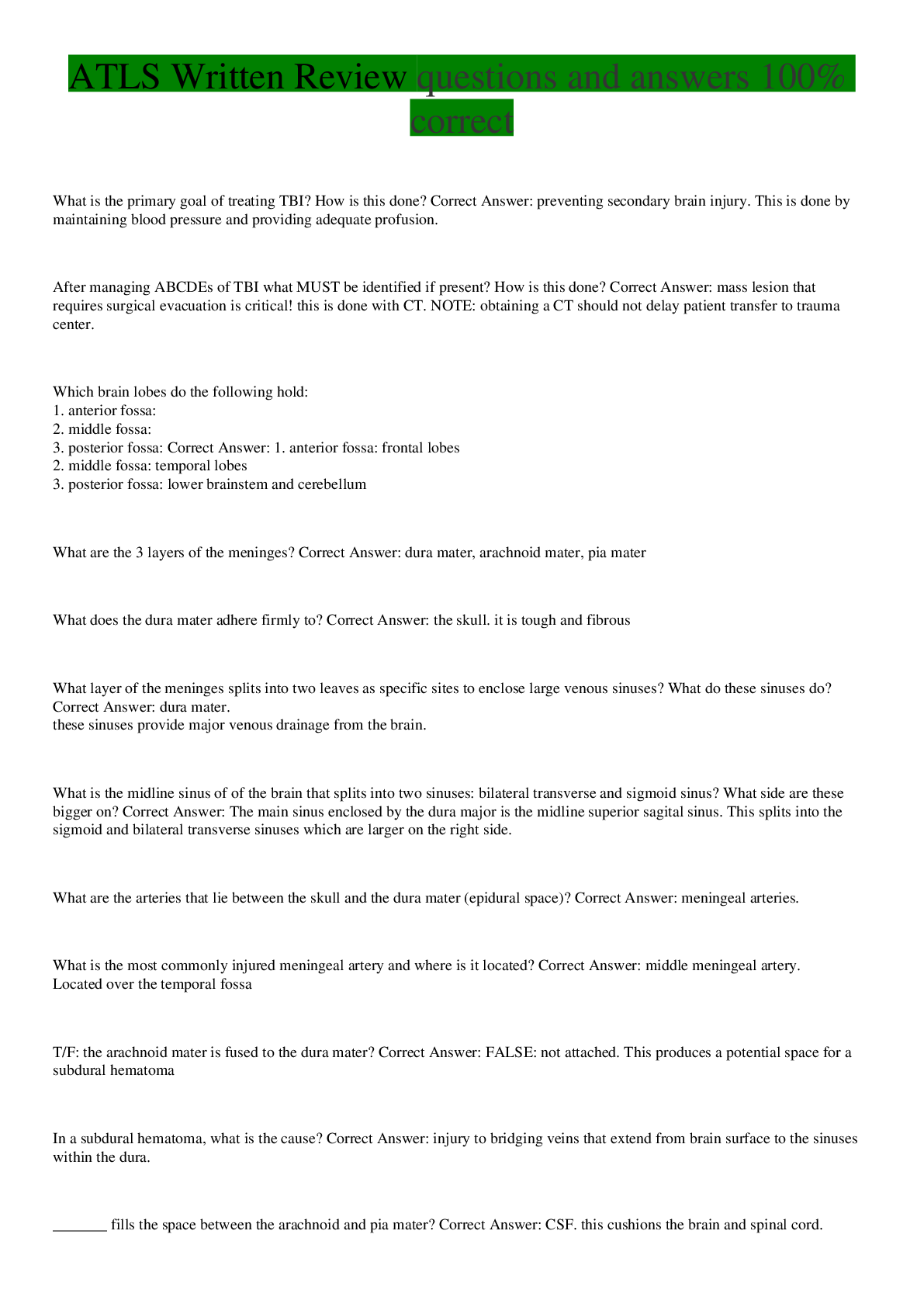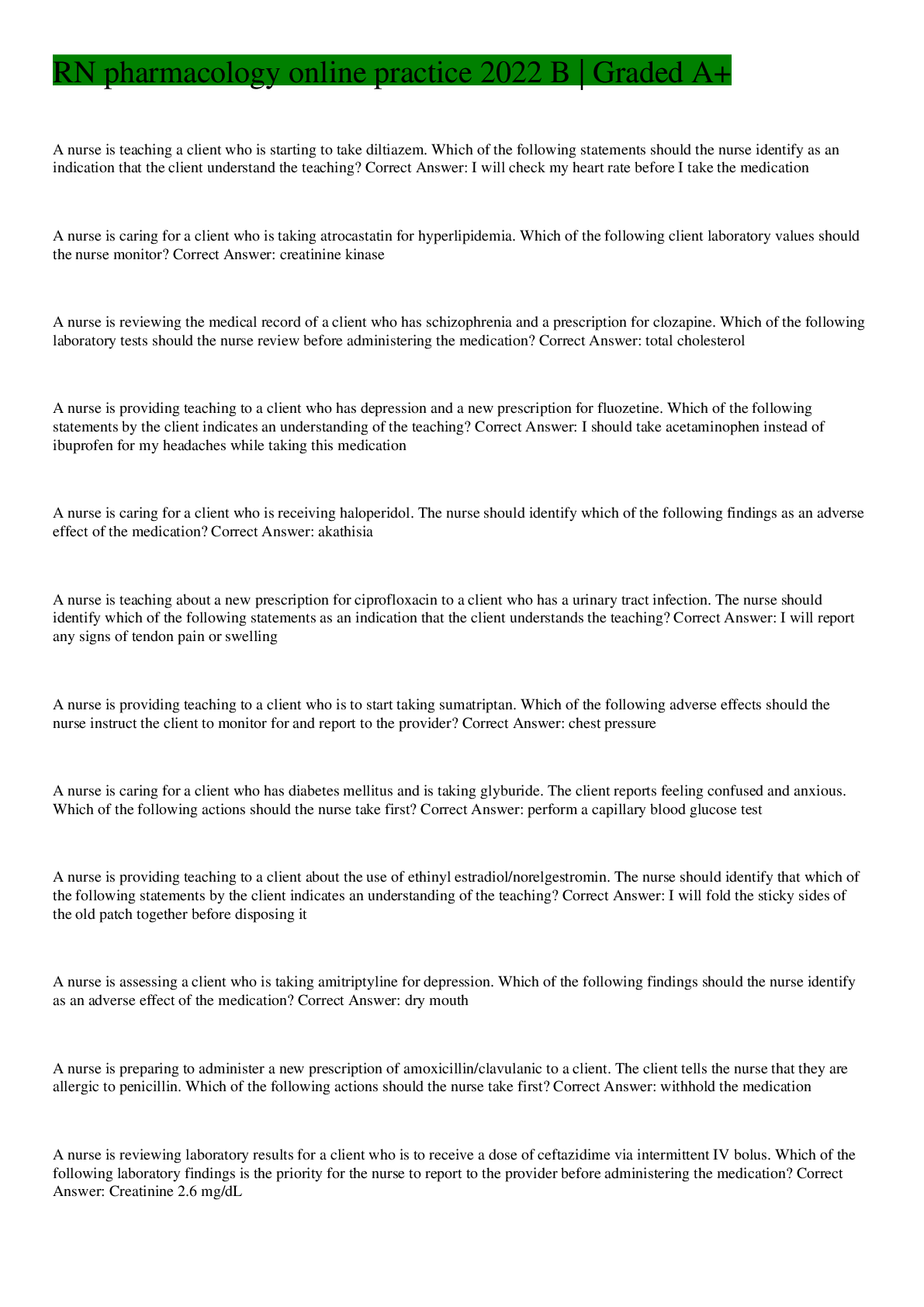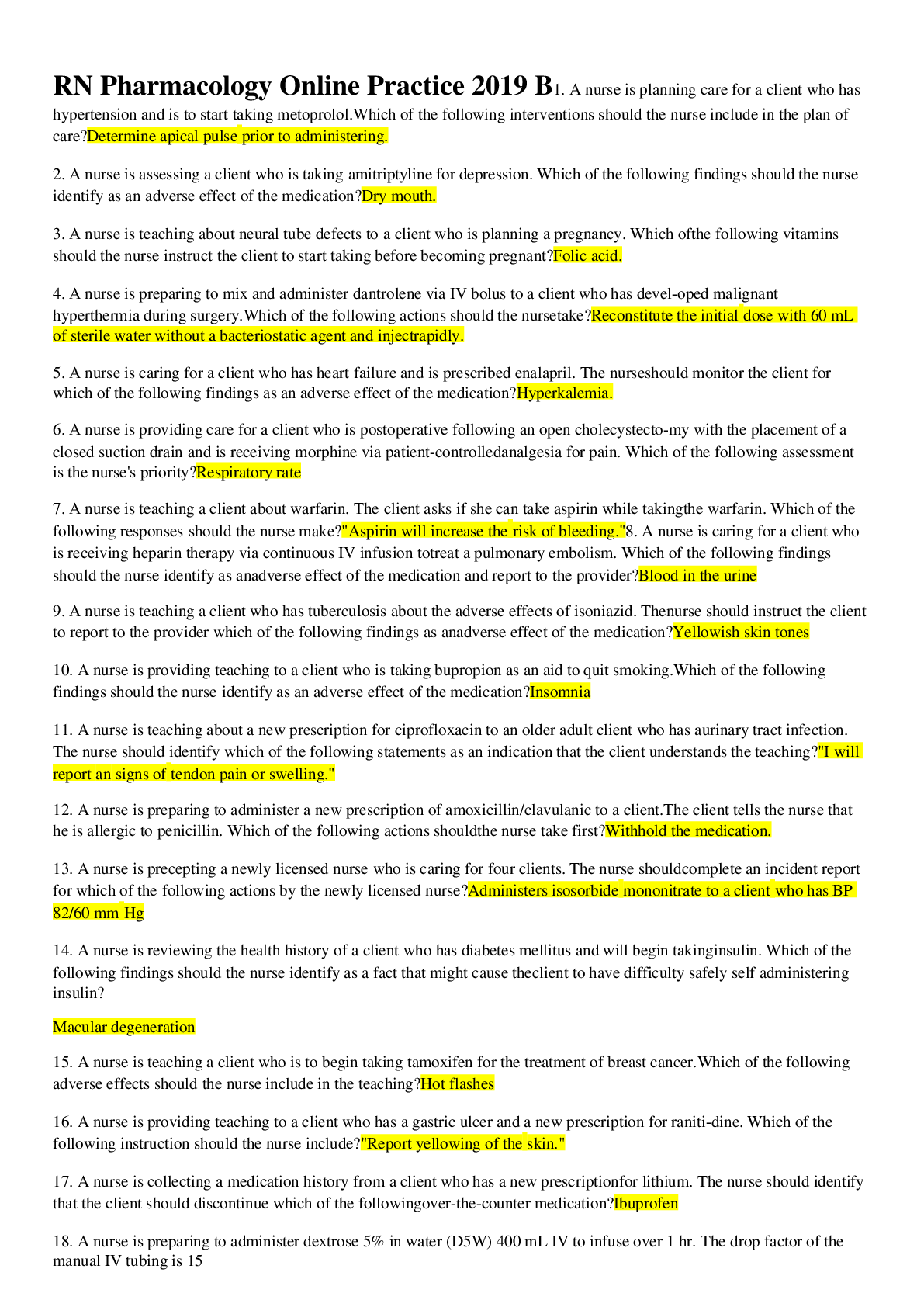US HISTORY UNIT 1 CHALLENGE 3 | 100 out of 100 | GRADED A
Document Content and Description Below
UNIT 1 CHALLENGE 3 Plato: An academic approach to concepts Select the option that accurately completes the statement below. Being a genius is a condition for being a college student. • A.)... sufficient, not necessary • B.)necessary, not sufficient • C.)neither necessary nor sufficient • D.)both necessary and sufficient C.)Correct. Not all geniuses are enrolled in a college. Therefore, being a genius is not a sufficient condition (or logical guarantee) for being a college student. Likewise, a person could be enrolled in a college but not be a genius. Therefore, being a genius is also not a necessary condition, or logical requirement, for being a college student. Select the option that accurately completes the statement below. Having wheels is a condition for being a functioning car. • A.)necessary, not sufficient • B.)sufficient, not necessary • C.)neither necessary nor sufficient • D.)both necessary and sufficient A.)Correct. All functioning cars have wheels, therefore, wheels are a necessary condition (or a logical requirement) for being a functioning car. Since not all things that have wheels are cars, having wheels is not a sufficient condition (or logical guarantee) for being a car. Select the option that accurately completes the statement below. Being a bodybuilder is a condition for being strong. • A.)sufficient, not necessary • B.)neither necessary nor sufficient • C.)necessary, not sufficient • D.)both necessary and sufficient A.)Correct. It is correct that all bodybuilders are strong, which makes being a bodybuilder a sufficient condition (or logical guarantee) for being strong. But not all strong people are bodybuilders, so being a bodybuilder is not a necessary condition (or logical requirement) for being strong. Plato's Forms: The Objects of Knowledge Select the statement that does NOT represent a central epistemological tenet of Plato's doctrine of the Forms. • A.)Forms are the abstract universals in which all particulars participate. • B.)The true nature of reality can only be uncovered by understanding the Forms. • C.)Knowledge is a justified true belief in which justification is grounded in understanding the world as it really is. • D.)An essence is a physical entity that is the building block of every object in the universe. D.)Correct. It's true that Plato's doctrine of the Forms defines essences as universal entities in which worldly objects participate, but essences are abstract entities that exist in the intellectual realm. They are NOT physical entities. Select the statement that represents a central epistemological tenet of Plato's doctrine of the Forms. • A.)If humans cease to exist, so does the Form of knowledge. • B.)Knowledge differs from opinion because knowledge requires one to be able to justify his or her beliefs. • C.)Forms are entities that exist only in the natural world. • D.)In philosophy, Forms play no role in determining what is morally right and wrong. B.)Correct. Plato believed that knowledge consists of three components: belief, truth, and justification. Justification means being able to support beliefs with good reasons. Beliefs that are not justified are only opinions. Select the statement that does NOT represent a central epistemological tenet of Plato's doctrine of the Forms. • A.)Understanding the essence of a thing is the only way to justify having true knowledge of that thing. • B.)Knowledge of the Forms enables one to understand the true nature of reality. • C.)Having an opinion about something assumes that you also have knowledge about that thing. • D.)A belief becomes justified when it can be accurately connected to the world. C.)Correct. Plato believed the opposite of this statement to be true. Having an opinion is one component of knowledge, but that opinion must be true and justified to qualify as knowledge. Plato Forms: The Foundations of Being Select the statement that represents a central metaphysical tenet of Plato's doctrine of the Forms. • A.)Individual objects participate in the Form of those objects. • B.)The essence of an object exists only when a human invents its Form. • C.)Only a cause-and-effect aspect exists between an object and its Form. • D.)The Form of an object is an imitation of the more genuine worldly object. A.)Correct. According to Plato, all objects participate in their Forms. This participation grounds worldly objects in truth. Select the statement that represents a central metaphysical tenet of Plato's doctrine of the Forms. • A.)A perfect circle exists in the world because the Form of a circle exists in the world. • B.)When the Form of a tree changes, the tree that exists in the world will change along with it. • C.)The Form of Humanity exists independently, regardless of the existence of human beings. • D.)Metaphysically speaking, a horse is more genuine than the Form of a horse. C.)Correct. According to Plato, Forms are real entities that exist in Platonic Heaven. They would exist even in the absence of humans. Select the statement that does NOT represent a central metaphysical tenet of Plato's doctrine of the Forms. • A.)The world of the senses is unchanging, but Platonic Heaven is in constant flux. • B.)A butterfly is a butterfly because it participates in the Form of a butterfly. • C.)It is the existence of the essence of Goodness that enables us to know examples of goodness in the world. • D.)All Forms exist in Platonic Heaven as ideal examples for their worldly counterparts. A.)Correct. It is true that this is an inaccurate description of Plato's metaphysics. In fact, this statement is directly opposed to the true description. According to Plato, the Forms in Platonic Heaven are perfect and unchanging and, therefore, provide the basis of knowledge. Applying Plato's Metaphysics Harper is a philosophy major who is debating with her roommates about the nature of humanity. According to Plato, what makes Harper a human being, and not something else? • A.)Harper understands the essence of humanity. • B.)Harper has the ability to ground her knowledge in reality. • C.)Harper participates in the Form of Human. • D.)Harper has an informed opinion about what it means to be a human. C.)Correct. This statement reflects Plato's argument that Forms are essences that ground all truth. An object is an object because it participates in the Form of that object. Charlie owns a small, skinny dog named Spot that bystanders often mistake for a cat. According to Plato, what causes Charlie's dog Spot to be a dog and not a cat? • A.)Spot fits his owner's belief of what a dog should look like. • B.)Spot is classified in the same genus and species as other dogs. • C.)The Form of Dog is the reason Spot exists as a dog. • D.)Spot chooses to embody the essence of a dog. C.)Correct. This statement reflects Plato's argument that Forms are essences that ground all truth. A dog is a dog because it participates in the Form of Dog. Kara is a political activist who protests against animal cruelty by boycotting products that are tested on animals. According to Plato, what determines whether Kara's act is just? • A.)It is a just act if Kara truly believes that it is a just act. • B.)The essence of justice determines whether or not the act is just. • C.)If the majority of people decide that the act is just, it is just. • D.)An act can be considered just if it promotes kindness. B.)Correct. This statement correctly applies Plato's argument that Forms are essences that ground all truth. An act is just because it participates in the Form (or essence) of Justice. The Footnotes to Plato Which of the following is a way in which Plato has impacted history and society? • A.)He was the first philosopher to equate philosophy with rhetoric. • B.)He reoriented philosophy away from ethics and epistemology and towards cosmology and natural philosophy. • C.)He proved that mathematics is a human invention that transcends culture. • D.)He taught Aristotle and started the Academy, a center of learning in ancient Athens. D.)Correct. This is indeed one of Plato's most significant historical contributions. Which of the following is a way in which Plato has impacted history and society? • A.)His work drew distinctions between important endeavors, including philosophy, and empty pursuits, including rhetoric. • B.)He was the first philosopher to study the biological and physical sciences in the way we study them today. • C.)His doctrine of Permanence had a profound influence on later philosophers. • D.)He introduced a method of philosophical investigation that uses dialectic to uncover truth. A.)Correct. It is true that Plato distinguishes between genuine technes (or “crafts") and what he called "pseudo crafts" in the "Gorgias." He classifies philosophy as the former, and rhetoric as the latter. All of the following are ways in which Plato has impacted history and society EXCEPT ? • A.)His Doctrine of the Forms and notion of essences have influenced modern philosophers who are interested in questions of epistemology and metaphysics. • B.)His work encourages us to pursue activities which bring us closer to truth, and to avoid those which focus on appearance. • C.)His metaphysical propositions have influenced thinkers in other disciplines, including theology. • D.)He advanced theoretical mathematics by proving that mathematical objects are theoretical objects, rather than real objects. D.)Correct. This statement misidentifies Plato's contribution to theoretical mathematics. According to Plato's doctrine of the Forms, numbers are real objects that exist in Platonic Heaven. Select the statement that correctly distinguishes Plato and Aristotle from one another in terms of their philosophical approaches. • A.)Plato would assert that those who want to learn about justice should start by studying just acts. Aristotle would argue that they should begin by examining the essence of justice. • B.)Aristotle believed that truth was independent of experience. Plato believed that truth was grounded in experience. • C.)Plato took a mathematical approach to philosophy. Aristotle was more interested in the sciences, particularly biology and physics. • D.)Plato's approach to philosophy was concerned with the physical world. Aristotle was only concerned with the metaphysical world. C.)Correct. • This is an accurate categorization of the philosophical approaches of Plato and Aristotle. Select the statement that correctly distinguishes Plato and Aristotle from one another in terms of their philosophical approaches. • A.)Aristotle believed that the abstract realm of the Forms was the ideal starting point for philosophical inquiry. Plato argued that worldly experience was the ideal starting point. • B.)Plato is considered an empiricist, while Aristotle is categorized as a rationalist. • C.)Aristotle believed that inquiry begins with the world experienced through the senses. Plato believed that inquiry begins in the metaphysical realm. • D.)Aristotle ignored the work of other philosophers. Plato considered alternative viewpoints. C.)Correct. • This is an accurate comparison of the philosophical approaches of Plato and Aristotle. Select the statement that best distinguishes Plato and Aristotle from one another in terms of their philosophical approaches. • A.)Aristotle would say that "A tree is a tree because it reflects the Form of a tree." Plato would say that "a tree is a tree because God made it a tree." • B.)Plato would say that we must have experiences with a tree to have knowledge of a tree. Aristotle would claim that we can have knowledge of a tree without having any experience with trees. • C.)Plato would say that we should dissect the bark of a tree to learn its essence. Aristotle would say that we cannot truly know the essence of a tree. • D.)Aristotle would say that if you wanted to learn the essence of a tree, you should study a tree. Plato would say that you should study the Form of a tree. D.)Correct. • This statement is an accurate comparison of the philosophical approaches of Plato and Aristotle. Aristotle on What There Is Bridget teaches a dog training class at her local animal shelter. She wants to provide the dog owners with some philosophical inspiration. According to Aristotle's metaphysics and ontology, what is true about the essence of a dog? • A.)The essence of a dog exists in Platonic Heaven. • B.)The essence of dog can only exist in actual dogs and nowhere else. • C.)Each dog has its own unique essence. • D.)A dog is a non-human object and therefore has no essence. B.)Correct. • Unlike Plato, Aristotle did not believe that essences could exist outside of actual objects. Therefore, the essence of a dog can only exist within actual dogs. Billie is investigating philosophical arguments used in a recent animal rights case involving the treatment of cattle in a feedlot. According to Aristotle's metaphysics and ontology, what is true about the essence of a cow? • A.)There is no difference between the universal "cow" and the particular "cow" because the essence of each is the same. • B.)The essence of a cow exists in the universal concept of cow, but not within each individual cow. • C.)The essence of a cow is composed of a genus and a differentia. • D.)The essence of a cow exists only in Platonic Heaven. C.)Correct. • According to Aristotle, the essence of an object consists of a genus (what kind of a thing an object is) and a differentia (what sets an object apart from other things of the same kind). Bob was about to fall asleep in his philosophy class when, suddenly, the instructor held up a spoon and challenged the class to find its essence. According to Aristotle's metaphysics and ontology, what is true about the essence of a spoon? • A.)The essence of a spoon exists, even if no spoons exist. • B.)"Spoon” is the particular, and "this spoon" is the universal. • C.)The essence of a spoon, or of any other object, cannot be discovered by mortals. • D.)It is a kitchen utensil for serving and eating liquids. D.)Correct. According to Aristotle, the essence of an object is comprised of what kind of a thing it is, and what sets it apart from other things of the same kind. Therefore, a spoon is a kitchen utensil (what kind of a thing) that is used for serving or eating liquids (what sets it apart). Plato vs. Aristotle: The Mathematician or the Biologist There are many similarities and differences between Platonic and Aristotelian metaphysics. Select the statement about metaphysics with which both Plato and Aristotle would agree. • A.)"The best way to learn about mathematics is to use it in a real-world context." • B.)"Letting our emotions guide our actions can help us to uncover the real truths of the world." • C.)"To learn the essence of a human, we must examine individual humans and identify the features that make them human" • D.)"I can only know the truth about justice if I understand the essence of justice." D.)Correct. • Both Plato and Aristotle were metaphysicians who believed that essences were real entities that existed and provided grounding for truth and knowledge. There are many similarities and differences between Platonic and Aristotelian metaphysics. Select the statement regarding metaphysics with which both Plato and Aristotle would agree. • A.)"What makes an act "kind" is determined by the way in which society has defined the word "kind." • B.)"Reasoning and logic are the ways in which we can obtain the truth." • C.)"Humanity exists only when humans exist." • D.)"Without matter, the laws of physics would have nothing to act upon, and thus would cease to exist." B.)Correct. It is true that both Plato and Aristotle were, first and foremost, philosophers. They committed their lives to discovering truth through reason and logic. There are many similarities and differences between Platonic and Aristotelian metaphysics. Select the statement about metaphysics with which only Aristotle would agree. • A.)"The laws of gravity are independent of matter." • B.)"To learn the essence of flowers, we must examine individual flowers and identify their essential features." • C.)"It is possible to uncover the truth and obtain knowledge about kindness." • D.)"The essence of horses is a genuine entity." B.)Correct.This statement reflects Aristotle's beliefs, not Plato's. Aristotle believed that essences exist only in the world as it is. Plato believed that essences exist in the non-physical realm, Platonic Heaven. [Show More]
Last updated: 1 year ago
Preview 1 out of 10 pages

Reviews( 0 )
Document information
Connected school, study & course
About the document
Uploaded On
May 15, 2021
Number of pages
10
Written in
Additional information
This document has been written for:
Uploaded
May 15, 2021
Downloads
0
Views
34


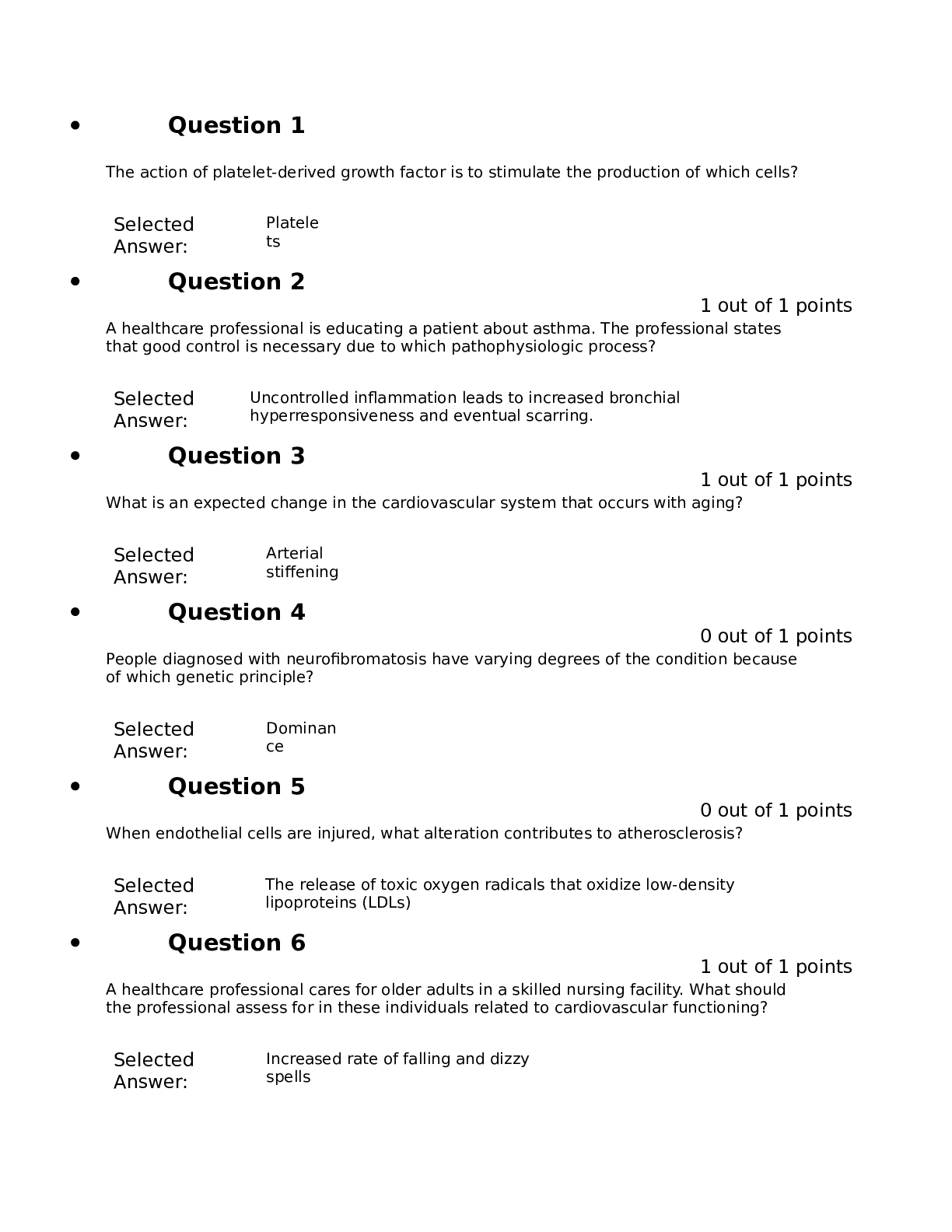
.png)
